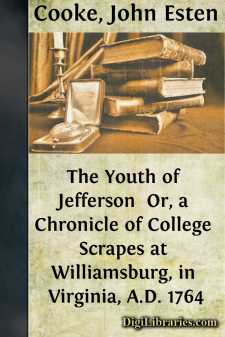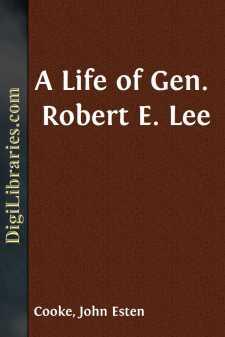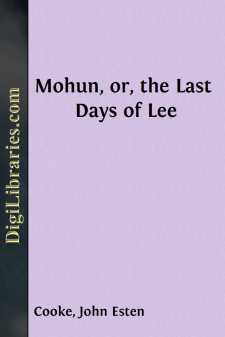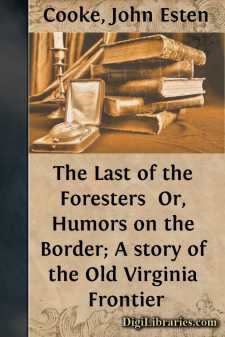Categories
- Antiques & Collectibles 13
- Architecture 36
- Art 48
- Bibles 22
- Biography & Autobiography 815
- Body, Mind & Spirit 144
- Business & Economics 28
- Children's Books 18
- Children's Fiction 14
- Computers 4
- Cooking 94
- Crafts & Hobbies 4
- Drama 346
- Education 58
- Family & Relationships 59
- Fiction 11834
- Games 19
- Gardening 17
- Health & Fitness 34
- History 1378
- House & Home 1
- Humor 147
- Juvenile Fiction 1873
- Juvenile Nonfiction 202
- Language Arts & Disciplines 89
- Law 16
- Literary Collections 686
- Literary Criticism 179
- Mathematics 13
- Medical 41
- Music 40
- Nature 179
- Non-Classifiable 1768
- Performing Arts 7
- Periodicals 1453
- Philosophy 65
- Photography 2
- Poetry 896
- Political Science 203
- Psychology 44
- Reference 154
- Religion 515
- Science 126
- Self-Help 85
- Social Science 83
- Sports & Recreation 34
- Study Aids 3
- Technology & Engineering 59
- Transportation 23
- Travel 463
- True Crime 29
John Esten Cooke
John Esten Cooke (1830–1886) was an American writer and Confederate soldier known for his novels, historical works, and biographies. He is best remembered for his Civil War-era novels such as "Surry of Eagle's Nest" and "Mohun," which provided a romanticized view of the Confederacy. Cooke also wrote historical works like "Virginia: A History of the People" and biographical sketches of notable figures including Robert E. Lee. His writing contributed significantly to the Lost Cause mythology and Southern literary tradition.
Author's Books:
Sort by:
by:
John Esten Cooke
HOW THREE PERSONS IN THIS HISTORY CAME BY THEIR NAMES. On a fine May morning in the year 1764,—that is to say, between the peace at Fontainebleau and the stamp act agitation, which great events have fortunately no connection with the present narrative,—a young man mounted on an elegant horse, and covered from head to foot with lace, velvet, and embroidery, stopped before a small house in the town...
more...
by:
John Esten Cooke
I. INTRODUCTION. The name of Lee is beloved and respected throughout the world. Men of all parties and opinions unite in this sentiment, not only those who thought and fought with him, but those most violently opposed to his political views and career. It is natural that his own people should love and honor him as their great leader and defender in a struggle of intense bitterness—that his old...
more...
by:
John Esten Cooke
PROLOGUE. On the wall over the mantel-piece, here in my quiet study at Eagle's-Nest, are two crossed swords. One is a battered old sabre worn at Gettysburg, and Appomattox; the other, a Federal officer's dress sword captured in 1863. It was a mere fancy to place them there, as it was a whim to hang upon that nail yonder, the uniform coat with its stars and braid, which Stuart wore on his...
more...
by:
John Esten Cooke
CHAPTER I. AT APPLE ORCHARD. On a bright October morning, when the last century was rapidly going down hill, and all old things began to give way to the new, the sun was shining in upon the breakfast room at Apple Orchard with a joyous splendor, which, perhaps, he had never before displayed in tarrying at that domain, or any other. But, about Apple Orchard, which we have introduced to the reader in a...
more...





